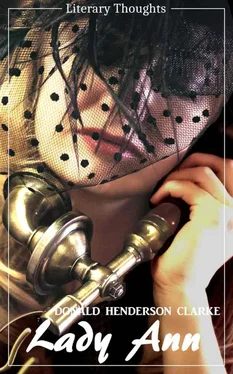He stood there listening, receiver held to his ear, big head slightly bent, broad shoulders bowed in the Steele stoop. Ann, a little breathless, a little frightened, stood looking at him from the doorway. After a long time he replaced the receiver on the wall and stood there motionless, staring right at her, but not seeing her. Ann choked a sob and said:
“Papa.”
Vina took her arm gently, and said:
“Come in here a moment, darling. I want to show you something.”
Ann, as in a dream, went with Vina. Tears were rolling down Vina’s face and she was sniffling. Suddenly Vina began to sob unashamedly. She sank down on her knees, and pressed Ann’s head to her wet face, and said:
“Oh, dear! Oh, dear!”
Ann began to tremble. She said:
“Is mama sicker?”
Vina choked, snuffled, and said:
“Your mama has gone away.”
“Mama is dead.”
Vina wailed, and Ann remained dry-eyed, pressed against Vina, Vina’s tears wetting her and Vina’s sobs wrenching at her heart. She had a sense that the world suddenly had become stripped of all life except hers, and that she was alone in the world—a vast, empty place.
Two months after Naomi had died and been buried in the Steele plot in Old Cemetery, Dr. Benham entered his combined office and residence in the Pease Block in Eastham, meeting George Miller at the door. The doctor said in his dictatorial manner:
“Come on in, George, and I’ll take care of you.”
George, who was in the roofing business, was about five feet six and weighed about one hundred and forty pounds. He was thin and nervous, with a white forehead, pale gray eyes, a beak of a nose twisted to the left, gold-filled teeth showing under a scraggly, tan-colored mustache, and not much chin. George scratched his nose, which was a habit with him. He was a morphine addict.
The doctor led the way into his private office. George took off his hat and fingered it nervously. He said:
“But, Doctor.”
“Tut! Tut!” Dr. Benham exclaimed, lighting an alcohol lamp and resting a teaspoonful of water over the flame. George stared at the doctor, as if fascinated, while the doctor got out morphine tablets and a hypodermic. George cleared his throat, and said:
“I just . . .”
The doctor said:
“Come on. Get your coat off, if you want this. I haven’t all day.”
George dazedly removed his coat and rolled up his sleeve. The doctor dabbed a bit of alcohol on the flesh, jabbed the needle home, pressed the plunger, removed the needle, mopped up with alcohol-saturated cotton, and said:
“That should make you feel different, George.”
George rolled down his sleeve and put on his coat, and said:
“I guess it will, Doc.”
Then he went out. A moment later young Alonzo West, who drove Dr. Benham and helped around the office, and studied medicine in his spare time, arrived. Dr. Benham looked up from the sink where he was washing his hands in surgeons’ soap, a green, liquid mixture, and said:
“Hello, Alonzo. I just gave old George Miller his five grains of morphine.”
The doctor shook his hands over the sink and reached for a towel, while Alonzo, who was eighteen, tall, raw-boned, with an unruly thatch of dark hair, almost black-brown eyes, a big nose and a solid chin, looked blank. He exclaimed:
“But I just gave him five grains myself, not five minutes ago. You were late, and he was so jumpy.”
Dr. Benham turned from the sink, still wiping his hands. His head, which always trembled the slightest bit when he was excited, began to shake rapidly. Alonzo said:
“Will anything happen to him, Doctor?”
Dr. Benham chuckled and said:
“Ten grains. Something certainly ought to happen.”
“Is there anything we can do?”
Dr. Benham replaced the towel on a rack, and reached with familiar gesture for a cigar in his waistcoat pocket. He bit off the end and spat it on the floor. He lighted it with a sulphur match, and then said, after throwing the burnt match on the floor:
“I wonder where he went.”
He looked at Alonzo an instant, and then grinned, showing strong yellow teeth. Alonzo said:
“Perhaps I could find him.”
The doctor drew in a mouthful of smoke and blew it out again. He said:
“Just sit still, Alonzo. I wouldn’t be surprised if old George found himself for us.”
Twenty minutes later the telephone rang. Dr. Benham lifted the receiver and said:
“Hello.”
He listened for a minute, nodding his head and scowling. He rumbled:
“On the roof of the church, eh? Well! Well! All right. Thank you, Will.”
He hung up the receiver and wheeled his swivel chair to face Alonzo.
“What was it?” Alonzo asked.
“That was Will Prescott,” Dr. Benham replied. “Will says old George is doing a Highland fling on the roof of the First Church and that everybody is scared he’s going to fall off. He thinks a doctor should be handy.”
Dr. Benham and Alonzo, in the doctor’s buggy, drawn by Sam, a bay gelding, twenty-three years old, stopped in the town square, on the east side of which was the white clapboard church building. A throng was gathered on the walk and the lawn in front of the church. The doctor gazed at the roof of the church and said:
“He’s pretty lively, ain’t he?”
George Miller was running backward and forward on the roof. He dashed to the north end, as if he were going to jump. Feminine shrieks and masculine shouts ceased as if cut with a knife when he checked himself on the edge and began to dance. Voices exclaimed:
“He’s crazy.”
“He’ll be killed.”
“I can’t look.”
“Come down, George.”
“Must be drunk.”
“He’s like a cat.”
“You’d never think the old feller had it in him.”
“Go it, Gawge.”
“Whee-ee!”
Alonzo groaned and said:
“This is awful, Doctor. I feel it’s my fault. Can’t we do something?”
Dr. Benham’s head was nodding, but he was grinning happily and sucking his long, strong cigar. He said:
“Don’t have to, boy. Here come the firemen to get him.”
Members of Puritan Engine Company raised a ladder against the eaves of the church and a half-dozen of them began to climb the rungs.
From the middle of the ridge pole George looked at them quietly for a moment, and then suddenly dashed down the slope of the roof toward the ladder. The watchers from below shouted and shrieked. George put on the brakes by sticking his feet into the eaves trough, and sitting down. He crowed like a rooster, flapped his arms, and galloped along the roof next to the eaves.
The volunteer firemen, sweat dripping from red faces, grunts issuing from hairy chests, crawled gingerly after George. The scene suggested a mountain goat being stalked by six nervous delicatessen-shop proprietors.
The constantly increasing throng on the green and in the road in front of the church shouted, cheered, shrieked, gasped, shuddered and giggled in turn. Bits of personal advice rose on the air:
“Head him off, Al.”
“Now you got him.”
“You’d think he was greased.”
“Put some salt on his tail.”
“Grab his foot.”
“Aw, you missed.”
“Quick, up the other side.”
“Better get a butterfly net, Bill.”
“Want a lasso, Al?”
“Why don’t you tackle him, Joe?”
“Attaboy, Al, grab his coat. Missed!”
“What you boys need is more practise.”
“Haw! Haw! Haw!”
“Looka that!”
Elihu Steele, with Ann beside him, drove up in his buckboard. Elihu was not connected in what might be termed a strictly official capacity with the church, but he looked after repairs on it and generally saw to it that it was in ship-shape condition. Elihu was dressed in his usual blue suit. Ann was wearing a plaid cloak of yellow and green squares and a green turban. Elihu said:
Читать дальше












